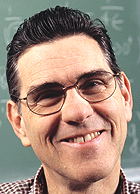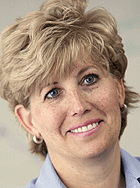Carl M. Bender, Ph.D., who is a world-renowned mathematical physicist, and Helen M. Piwnica-Worms, Ph.D., whose studies have paved the way for the development of new therapies for cancer patients, will receive the University’s 2007 faculty achievement awards, Chancellor Mark S. Wrighton announced.
Bender, professor of physics in Arts & Sciences, is the winner of the Arthur Holly Compton Faculty Achievement Award, and Piwnica-Worms, professor of cell biology and physiology and of internal medicine at the School of Medicine, is the winner of the Carl and Gerty Cori Faculty Achievement Award.
They will receive their awards and give presentations of their scholarly work during a 6 p.m. ceremony Dec. 1 in the Bryan Cave Moot Courtroom in Anheuser-Busch Hall. The program will be followed by the Chancellor’s Gala at the Charles F. Knight Executive Education Center.
“Professors Bender and Piwnica-Worms are excellent selections for this wonderful recognition,” Wrighton said. “Both are extremely deserving of this high honor they are receiving from their colleagues. Washington University has benefited enormously from the quality of their research, teaching and service.”
Bender is an internationally recognized leader in the application of advanced mathematical techniques to problems in quantum mechanics and elementary particle physics, and he has initiated several new areas of research.

These include pioneering work on perturbation theory, expansions in the dimension of space-time and generalizations of the theory of quantum mechanics. He has contributed significantly to the repertoire of advanced mathematical methods essential to cutting-edge quantitative research across many fields from biology to meteorology.
A Phi Beta Kappa, Bender earned a bachelor’s degree, summa cum laude, in physics from Cornell University in 1964 and both a master’s (’65) and doctorate (’69) in physics from Harvard University. After seven years on the Massachusetts Institute of Technology (MIT) faculty, he joined Washington University’s Department of Physics in 1977.
He has held visiting appointments at Imperial College in London and Technion – Israel Institute of Technology, and he has been a scientific consultant at the Los Alamos National Laboratory since 1979.
Bender was selected as Los Alamos’ 2007 Ulam Distinguished Scholar. He spent the 2006-07 academic year in residence at Los Alamos’ Center for Nonlinear Studies.
He has co-authored a classic book titled “Advanced Mathematical Methods for Scientists and Engineers” (1977, 1999) with Steven Orszag of MIT. He is finishing a companion to this book, titled “Partial Differential Equations for Scientists and Engineers.”
A prolific researcher with an extraordinary publication record, Bender also excels as a teacher of undergraduates and mentor of graduate students. He has received numerous awards for teaching excellence and mentoring.
His teaching also extends to the St. Louis community, and in 2002, Bender received the Fellows Award of the Academy of Science-St. Louis for “a record of excellence in communicating to and mentoring colleagues, future scientists/engineers and the general public.”
He has won Guggenheim, Sloan, Fulbright and Lady Davis fellowships and is a fellow of the American Physical Society and of the United Kingdom Institute of Physics. He is editor in chief of the Journal of Physics A, a prestigious international mathematical physics journal.
Piwnica-Worms‘ research has transformed and refined the view of how the cell regulates its own progression through its life cycle. She has helped elucidate how checkpoints interface with the cell cycle machinery to bring about delays in the cell’s progress through life. The delays provide cells with important opportunities to inspect their DNA for damage.

If damage is detected, cells can attempt to repair it or self-destruct to prevent that damage from leading to cancer. The insights Piwnica-Worms’ lab has generated have quickly gone from bench to bedside, inspiring and enabling clinical trials for innovative new cancer treatments.
Piwnica-Worms earned a doctorate at Duke University School of Medicine and did postdoctoral research at the Dana-Farber Cancer Institute.
Following appointments at Tufts University School of Medicine and Harvard Medical School and Beth Israel Deaconess Medical Center, Piwnica-Worms came to Washington University in 1994, where she soon became a professor. She also is a Howard Hughes Medical Institute investigator.
Piwnica-Worms has won national and international recognition for her scientific contributions. She was a Damon Runyon Fellow and a Pew Scholar of the Biomedical Sciences. In addition, Piwnica-Worms was a recipient of the Spirit of Health Award for Cancer Research from the American Cancer Society.
Piwnica-Worms serves on the scientific advisory board of the Ataxia-Telangiectasia Children’s Project and the Abramson Family Cancer Research Institute at the University of Pennsylvania.
She has been elected a fellow of the Academy of Science-St. Louis and was elected to the board of directors of the American Association for Cancer Research.
At the University, she has served on search committees for the heads of several medical school departments and on the Medical Science Training Admissions Committee for nine years. In addition, she helped build the molecular oncology program.
At Siteman Cancer Center, she leads the Cellular Proliferation program and is a member of the Siteman Cancer Center Executive Committee, the Siteman Cancer Center Basic Science Leadership Committee and the Cancer Biology Pathway Selection Committee.
The awards include a $5,000 honorarium.